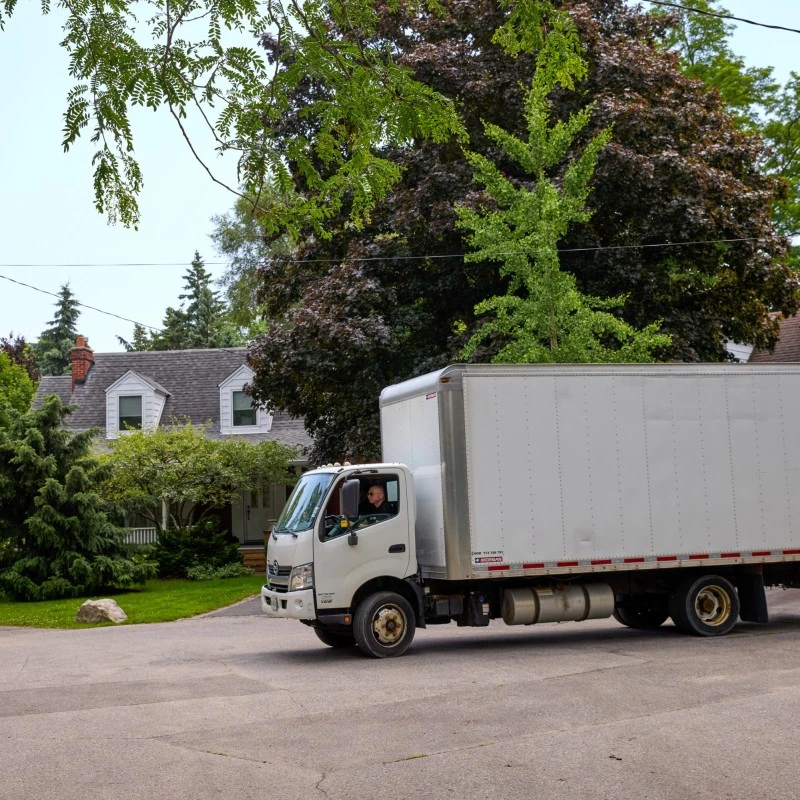The Cost of Living in Canada [2025]

![The Cost of Living in Canada [2025] The Cost of Living in Canada [2025]](https://cdn.topmove.ca/image/blog/e0ae4bc7115f70ed28e7a3c62dad36a9.jpeg)
Many residents can agree that Canada is a prime place to live. Canada offers a perfect balance, from vast, sweeping natural land and seascapes, to diverse multiculturalism, and a strong economy.
It’s also one of the more expensive countries to live in. However, it's still more affordable than living in countries like the US, UK, Japan or New Zealand.
There's a lot to juggle when planning a move to a new country. One way to prepare is by doing the right research. By comparing your income with the general cost of living in Canada, you can discern whether Canada is the right fit for you.
Reasons to move to Canada

Canada’s cold, dark winters aren’t enough to keep approximately 500,000 new immigrants from moving here annually.
People from all around the world come to Canada seeking a high quality of life combined with friendly neighbours, multiculturalism and access to some of the most beautiful nature that the world has to offer.
In Canada, the cities are safe, the government is stable, healthcare is accessible, and there is a strong economy with a diverse job market. All of these factors, combined with the benefit of high-quality educational institutions and great social benefits and programs make Canada an ideal place for studying, raising a family, retiring, starting a business, or living closer to relatives.
What is the average salary in Canada?
Canada ranks 9th on the list of highest average annual salaries by country. The median hourly wage in Canada is CA$36.01 per hour, and the median annual salary is CA$67,282. Average and median salaries are highest in Calgary, followed by Edmonton, Ottawa and Vancouver.
If you are looking to enrol at a college or university to get a degree, or are coming to Canada with a bachelor’s degree already—know that with your degree, you can earn up to 24% more income than the national average.
The average minimum wage in Canada is CA$16.27 per hour, reflecting the varying rates set by provinces and territories. The federal minimum wage will increase to $17.70 per hour as of April 2025—applying specifically to workers in federally regulated industries like banking and telecommunications. The federal rate is adjusted annually for inflation and is typically higher than the national average
High-paying professions
Immigration.ca and Indeed Canada (the #1 job searching site) both list cardiologists and medical anesthesiologists as the careers with the highest-paying salaries in Canada. These salaries average at CA$355,989 and CA$356,849.
Other high-paying professions include:
- Surgeon: CA$391,886
- Psychiatrist: CA$345,665
- Orthodontist: CA$278,549
- Controller: CA$214,405
- Petroleum Engineer: CA$185,472
- Airline Pilot: CA$184,861
- Cloud Architect: CA$152,636
- Software Engineering Manager: CA$148,051
- Dentist: CA$134,919
- Data Scientist: CA$139,684
- Geoscientist: CA$119,300
- IT Manager: CA$118,207
- Financial Manager: CA$118,112
- Corporate Lawyer: CA$113,468
- Pharmacist: CA$109,038
- Electrical Engineer: CA$107,999
- Human Resources Manager: CA$107,148
- Marketing Manager: CA$103,656
Tax in Canada

Canada’s income tax system is easy to understand. You pay a certain percentage of taxes from your salary or income, based on your annual earnings.
In Canada, the federal tax brackets for 2024 are as follows:
-
15% up to CA$55,867 of taxable income
-
20.5% between CA$55,867 and CA$111,733
-
26% between CA$111,733 and CA$173,205
-
29% between CA$173,205 up to CA$246,752
-
33% on any taxable income exceeding CA$246,752
In addition to federal taxes, each province/territory has its own tax rates, which vary. This results in a combined tax rate depending on where you live.
If you are an employee, your employer will deduct your income taxes off of your earnings every time they pay you. If you are self-employed, you must tax your services and put aside the required amount until it's time to file your taxes.
Cost of living in Canada

Most Canadians spend 35% to 50% of their income on housing and utilities. This varies by province/territory; for example, wages and salaries are generally higher in Alberta, and housing prices and rental rates are lower than other parts of Canada.
An analysis by the Royal Bank of Canada revealed that Canadian housing reached its highest level of unaffordability in 2022. That record was surpassed a year later, with 63.8% of the median household income needed to cover the costs of owning a typical home.
As of January 2025, the national average home price decreased to $676,640, representing a 2.6% decline from November 2024.
Regional house prices
In 2024, Canada's housing market showed signs of recovery following a significant slowdown in 2023. Nationally, home sales reached 43,239 in December 2024, a 14% increase compared to December 2023.
Throughout 2024, total home sales increased by 2.6% to 67,610 units, with new listings up 16.4%.
The Canadian Real Estate Association (CREA) forecasts that approximately 532,704 residential properties will trade hands, resulting in an 8.6% increase from 2024.
Average regional house prices:
Here are the average home prices for major cities in Canada for 2025:
-
Toronto: CA$1,067,186
-
Vancouver: CA$1,275,672
-
Montreal: CA$620,644
-
Calgary: CA$605,074
-
Edmonton: CA$436,401
-
Ottawa: CA$619,708
-
Quebec City: CA$510,884
-
Halifax: CA$440,020
Average house prices by province:
-
British Columbia: CA$1,013,556 (Provincial Average)
-
Quebec: CA$510,884
-
Alberta: CA$493,828
-
Nova Scotia: CA$440,020
-
Newfoundland and Labrador: CA$329,346
-
Prince Edward Island: CA$358,000
-
Manitoba: CA$392,000
-
Saskatchewan: CA$382,000
-
New Brunswick: CA$391,000
-
Northwest Territories: CA$375,000
-
Yukon: CA$475,000
-
Nunavut: CA$450,000
Renting in Canada
In Canada, rental payments are due on the 1st of every month, and rental rates vary by city.
Here are some average rental prices for Canadian cities as of 2024:
- Vancouver: CA$2,512 (1-bedroom), CA$3,430 (2-bedroom)
- Toronto: CA$2,360 (1-bedroom), CA$3,077 (2-bedroom)
- Montreal: CA$1,740 (1-bedroom), CA$2,260 (2-bedroom)
- Calgary: CA$1,711 (1-bedroom), CA$2,073 (2-bedroom)
- Winnipeg: CA$1,360 (1-bedroom), CA$1,760 (2-bedroom)
- Saskatoon: CA$1,183 (1-bedroom), CA$1,387 (2-bedroom)
- Quebec City: CA$1,305 (1-bedroom), CA$1,711 (2-bedroom)
- Edmonton: CA$1,312 (1-bedroom), CA$1,639 (2-bedroom)
- Kelowna: CA$1,914 (1-bedroom), CA$2,375 (2-bedroom)
The monthly cost of living in Canada
The cost of living in Canada for a family of four in a major city, is between CA$5,500– CA$7,700 per month.
For a single person living in a 1-bedroom apartment, the monthly cost of living averages between CA$2,200–CA$3,900, depending on the city.
Cost of living by city
Toronto

Toronto is Canada’s largest city and the financial epicentre of the country. Finance, tech and media are huge industries here—adding high-paying jobs to the job market. You will need a high-paying career to live comfortably in Toronto, due to the fact that it's the second most expensive city in Canada.
According to the website Canada For Newbies, the average cost of living per month for a single person in Toronto (living simply) is CA$3,800. For a family of four, you would need on average CA$7,750 per month to live.
Rent is high in Toronto. If you live alone, expect to pay CA$2,360 on average for a 1-bedroom apartment. For families, expect to pay a minimum of CA$3,100 for a place with 2 bedrooms or more.
Public transit is great if you live in and around Toronto’s centre. Expect long commute times if you are coming from one of the many surrounding suburbs—you may want to consider investing in your own vehicle.
For more about the 'The Cost of Living in Toronto.
Montreal

One of the many desirable things about Montreal is that the cost of living is lower than in other major Canadian cities. On top of that, you get diversity from a unique blend of French and North American cultures. Montreal has a strong arts scene, and is a hub for some of the best education Canada has to offer. The city attracts creatives and students to join the multitude of immigrants from all over the world who call Montreal home. These factors make Montreal a cultured, artistic and diverse city to live in.
A one-bedroom apartment in Montreal averages around CA$1,740 per month. For families, expect to pay on average CA$2,260 or more for a 2-bedroom (or larger) place.
You don’t need a car, because Montreal’s network of buses and subways can get you anywhere you need to go, quickly and conveniently.
Read more about The Cost of Living in Montreal.
Vancouver

Vancouver’s beauty and mild, temperate weather comes with a price. Being the third most expensive city in the world following Hong Kong and Sydney, Australia, Vancouver is inaccessible to many. The city is known for its modern, metropolitan feel, its booming film industry, and its close proximity to the great B.C. outdoors, specifically Whistler, a globally-renowned ski destination. Its popularity amongst Canadians, as well as widespread foreign property investments have driven up the cost of living exorbitantly.
A one-bedroom apartment in Vancouver averages around CA$2,512 per month, while an apartment or home with 2 bedrooms or more averages CA$3,430.
Vancouver’s public transit network is decent and cost-effective—however, if you are commuting from surrounding areas such as Abbotsford, you will need a vehicle in order to save time.
Read more about The Cost of Living in Vancouver.
Calgary

Calgary has a strong job market and is known and loved for its beautiful natural surroundings, specifically its proximity to world-famous Banff National Park. The cost of living in Calgary is lower in comparison to other Canadian cities, making it appealing to many. In general, wages and salaries in Alberta are higher, adding to Calgary’s appeal.
A one-bedroom apartment in Calgary averages around CA$1,711, and is cheaper if you rent outside of the downtown core. A 2-bedroom place or larger will average around CA$2,073 in the city centre.
Read more about the Life in Calgary: Cost of Living, Lifestyle and Challenges
What do everyday items cost in different parts of Canada?
Listed below are the average monthly costs for everyday items in different Canadian cities:
Toronto
- Groceries: A single person usually spends between CA$210 and CA$315 per month on groceries, while a family of four spend around CA$840 to CA$1,050.
- Clothing: Expect to pay CA$105–315 monthly on clothing in Toronto.
- Utilities: The average monthly cost of utilities in Toronto, including electricity, heating, cooling, water, and garbage, is around CA$158–263 for a standard-sized apartment.
- Household items and services: The average monthly cost for household items and services in Toronto, including cleaning supplies, toiletries, and basic maintenance services, ranges from CA$105–210, depending on household size and lifestyle.
- Entertainment: The average monthly cost for entertainment in Toronto, including dining out, movies, events, and recreational activities, typically ranges from CA$210–420, depending on personal preferences and frequency of activities.
- Transportation: The average monthly transportation cost is CA$164 for a TTC Monthly Pass, covering unlimited subway, bus, and streetcar rides. For those who often use GO Transit for regional travel, monthly costs can range from CA$210–315, depending on the distance. Adding TTC and GO Transit, the monthly average could reach CA$350–460.
Montreal
- Groceries: A single person typically spends between CA$210 and CA$368 per month on groceries, while a family of four spend around CA$890 to CA$1,260.
- Clothing: The average monthly spending on clothing ranges from CA$53–158, depending on individual shopping habits, seasonal needs, and preferences for brand and quality.
- Utilities: The average monthly cost of utilities including electricity, heating, cooling, water, and garbage, usually falls between CA$105–210 for a standard-sized apartment.
- Household items and services: The average monthly cost for household items and services including cleaning supplies, toiletries, and basic maintenance, generally ranges from CA$84–158, depending on household size and lifestyle.
- Entertainment: The average monthly cost for entertainment including dining out, events, movies, and recreational activities, typically ranges from CA$158–368, depending on personal preferences and frequency of activities.
- Transportation: The average monthly cost of transportation is CA$98 for an STM Monthly Pass, covering unlimited Metro and bus rides. For regional train services through the AMT, monthly costs vary based on distance, starting at CA$142.
Vancouver
- Groceries: Based on the number of people in your household, the average cost of groceries per month in Vancouver ranges from CA$394–630.
- Clothing: The average monthly spending on clothing typically ranges from CA$79–210, depending on individual shopping habits and lifestyle choices.
- Utilities: The average monthly cost of utilities in Vancouver, including electricity, heating, cooling, water, and garbage, typically ranges from CA$158–263 for a standard-sized apartment.
- Household items and services: The average monthly cost for household items and services, including cleaning supplies, toiletries, and basic maintenance, ranges from CA$105–210 depending on household size and lifestyle.
- Entertainment: The average monthly cost for entertainment in Vancouver, including dining out, events, movies, and recreational activities, typically ranges from CA$210–420, depending on personal preferences and frequency of activities.
- Transportation: The average monthly cost for transportation using TransLink's Compass Card system is CA$105 for a monthly pass, which provides unlimited travel on SkyTrain, bus, and SeaBus services.
Calgary
- Groceries: A single person can expect to spend about CA$451 monthly on groceries, depending on dietary preferences and shopping habits.
- Clothing: The average monthly expenditure on clothing falls between CA$79–210.
- Utilities: For one person, the average monthly cost for utilities ranges from CA$158–263, depending on usage and the size of the living space.
- Household items and services: The average monthly cost for household items and services, including cleaning supplies, toiletries, and basic maintenance ranges from CA$84–158, depending on individual needs and household size.
- Entertainment: Monthly entertainment costs range from CA$126–189 per person, depending on activities, such as dining out, attending live music or theatre, visiting museums and galleries, and enjoying outdoor activities in the nearby Rocky Mountains.
- Transportation: The monthly costs for transportation are as follows: a bus monthly pass is CA$122 (discounted to CA$96 for seniors and CA$101 for youth) while driving typically costs around CA$95–126 for gas. Cycling is essentially free!
The unexpected cost of living in Canada
Transportation
More than 90% of Canadians live within 100 miles of the US border.
This means that transportation routes and infrastructure are limited in areas away from the border. It's, therefore, more time-consuming and expensive to travel around Canada. Canada has a small population for its size, limiting the frequency of domestic flights. This makes domestic flying expensive for residents.
Food
Canada is so cold in the winter, and farming is paused during the cold seasons from October to April. During these months, produce is imported from places like California and Mexico. Some things come from as far as New Zealand.
This makes it extremely expensive to buy produce, and less nutritious during the cold months.
Winter adaptations
Canadian winters are cold, and depending on the region, harsh and long.
Heat bills are exorbitant in the winter, so factor in spending a portion of your income keeping your house warm.
Also, everywhere except BC’s west coast requires that your car be fitted with appropriate winter tyres for driving in ice and snow.
Moving to Canada
 One thing’s for sure, Canada is expensive. However, residents believe it is worth it for the quality of life, diversity and natural beauty that Canada provides. Universal healthcare, excellent education, a strong social safety net add to the appeal and contribute to overall well-being for Canadians.
One thing’s for sure, Canada is expensive. However, residents believe it is worth it for the quality of life, diversity and natural beauty that Canada provides. Universal healthcare, excellent education, a strong social safety net add to the appeal and contribute to overall well-being for Canadians.
Despite some expenses being high, Canada is fun, welcoming and full of different cultures, making it a desirable place to call home.
What do our customers say?


![The cost of living in Ottawa [2025] The cost of living in Ottawa [2025]](https://cdn.topmove.ca/image/blog/05c56698337852b128efa8b1144e6466.jpeg)
![The cost of living in Ottawa [2025] The cost of living in Ottawa [2025]](https://cdn.topmove.ca/image/blog/c761f4e001bbc63ac9a49e0c0599d596.jpeg)
![The Cost of Living in Winnipeg [2025] The Cost of Living in Winnipeg [2025]](https://cdn.topmove.ca/image/blog/8874f5688baa4a1291d7eae6c507f8aa.jpeg)
![The Cost of Living in Edmonton [2025] The Cost of Living in Edmonton [2025]](https://cdn.topmove.ca/image/blog/85d8f0085c5276a3f3add5828109b82a.jpeg)
![The Cost of Living in Victoria [2025] The Cost of Living in Victoria [2025]](https://cdn.topmove.ca/image/blog/012c60baf3a9dd52b2112857fe508e4c.jpeg)
![The Cost of Living in Calgary [2025] The Cost of Living in Calgary [2025]](https://cdn.topmove.ca/image/blog/44a5bcb6ebf6c658f5c5fe30ab7077c9.jpeg)
![The Cost of Living in Montreal [2025] The Cost of Living in Montreal [2025]](https://cdn.topmove.ca/image/blog/3d9ba911fae51ef6bf042019500f2c4b.jpeg)
![The Cost of Living in Toronto [2025] The Cost of Living in Toronto [2025]](https://cdn.topmove.ca/image/blog/ded0549bf885e2463f6b3516d9f8f021.jpeg)

![How much do you need to earn to live comfortably in Vancouver? [2025] How much do you need to earn to live comfortably in Vancouver? [2025]](https://cdn.topmove.ca/image/blog/7036030cc91de9cff4153dc88aa88f85.jpeg)
![How much do you need to earn to live comfortably in Victoria? [2025] How much do you need to earn to live comfortably in Victoria? [2025]](https://cdn.topmove.ca/image/blog/f0bdeb7f43a3340afba84793c4fddbac.jpeg)
![How much do you need to earn to live comfortably in Montreal? [2025] How much do you need to earn to live comfortably in Montreal? [2025]](https://cdn.topmove.ca/image/blog/80e0ee82a5a92d9451b96ff875513ee4.jpeg)
![How much do you need to earn to live comfortably in Toronto? [2025] How much do you need to earn to live comfortably in Toronto? [2025]](https://cdn.topmove.ca/image/blog/de7b110360e9510bfcb89724b7ef9af4.jpeg)
![How much do you need to earn to live comfortably in Calgary? [2025] How much do you need to earn to live comfortably in Calgary? [2025]](https://cdn.topmove.ca/image/blog/46fef724030602a02f51110ffb3ac569.jpeg)
![How much do you need to earn to live comfortably in Winnipeg? [2025] How much do you need to earn to live comfortably in Winnipeg? [2025]](https://cdn.topmove.ca/image/blog/d52ddc1f425f60fd553dcc00f7eb0fb5.jpeg)










